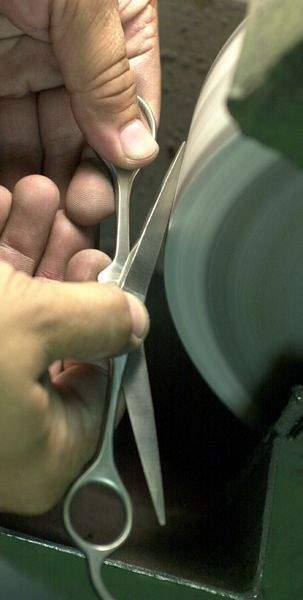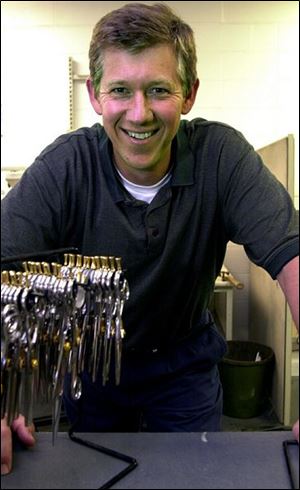
Firms aim to regain cutting edge
10/3/2004
Arius-Eickert, like the other Fremont cutting-tool makers, has adapted by focusing on high-margin products.
Luke Wark / The Blade
Buy This Image

Arius-Eickert, like the other Fremont cutting-tool makers, has adapted by focusing on high-margin products.
FREMONT - When 127-year-old Clauss Cutlery ended operations here last week, it was another nail in the coffin of a once huge local industry that employed thousands.
With roots stretching to medieval Europe, the industry's factories churned out straight razors for laborers in the 19th century and Ginsu knives for homemakers roped in by telemarketing in the late 20th century.
One by one over the last three decades, numerous factories selling those and other products fell victim to mergers and inexpensive foreign imports, as did this community's reputation as a center of knife and blade production.
With dozens of firms employing 3,000, Fremont was known for nearly 100 years as a cutlery capital of the United States, according to industry executives. Today, only five companies remain.
Ari Eickert, a German immigrant who set up shop here in the early 1980s, doesn't intend to be another fatality. And he isn't alone.
Shunning production of household scissors and other low-profit cutlery products spat out by the millions from the forges of China, Mr. Eickert's firm and another of the survivors are helping keep the tradition alive by focusing on high-tech, high-margin applications.
What's more, they are using Asia's still-existing, although dwindling, manufacturing technology gap and the strength of the euro against the dollar to boost sales in Europe.
Fremont, with nearly 18,000 residents, is in Sandusky County about 30 miles southeast of Toledo.

Uwe Eickert is president of the specialty scissors firm founded by his father, Ari in 1981 . Each pair is hand made and is aimed at niche markets mass manufacturers can't fill.
"We've survived because we've adapted," said Mr. Eickert's son, Uwe, president of Arius-Eickert Inc. "We make high-value shears that others can't make.
At Arius-Eickert, which caters to hair stylists, the list includes $400 scissors with industrial-diamond-coated blades designed to last.
Other customers include NASA. The space agency needed tough scissors capable of slicing through rigid material on space suits without spraying fiber particles throughout the crew quarters in the weightless environment of outer space.
Arius filled the bill, creating specialized scissors made for NASA exclusively.
At nearby Crescent Manufacturing Inc., low-end razor products have given way to razors used in laser eye surgery and to cut computer chips.
The firms are heirs to a legacy that began here in the 1880s when John Clauss moved his shear company to Fremont from Elyria, near Cleveland.
When natural gas was discovered in Fremont, Mr. Clauss saw an opportunity to get closer to an energy source for his factory furnaces.
Fire destroyed the Clauss factory in 1890. Townspeople bought bonds to finance reconstruction and crews worked under then-novel electric spotlights well into the night to complete the work by spring, according to an industry executive.
In 1918, according to records at the Hayes Presidential Center in Fremont, Mr. Clauss merged with locally based Henkel Co., which started out making surgical instruments and grew into the largest scissor manufacturer in the world.
To feed the growing need for skilled workers, Mr. Clauss turned to Sol ingen, Germany, a town near the Rhine River in Westphalia, famous since the Middle Ages for its swords and cutlery.
According to legend, the town developed the specialty after Christian crusaders were exposed to the renowned swords of Damascus.
Many residents of the town immigrated to Fremont, where they worked in factories that in the late 19th and early 20th century churned out thousands of nail files, shaving razors, kitchen knives, tweezers, and other products.
After having toiled in a factory for a few years, many workers struck out on their own, operating out of small shops or from their homes, industry executives said. Some lasted just a few years, some for decades.
At Christy Co., E.B. Christy, the firm's 83-year-old president, often answers the phone. Founded in 1891 by Mr. Christy's grandfather, the company now makes only product, a sliding-blade pocket knife developed 40 years ago.
Most sales are by mail order, although the company doesn't have a Web site or advertise, Mr. Christy said. "Since the knife has been produced since 1965, there are a lot of knives out there," explained Mr. Christy, who heads a staff of four. "Each carries our name and address. People see them, and place orders."
B.A.P. Manufacturing Inc., which was founded here in 1976 as B & P Manufacturing, advertises that it makes "specialty blades and edges" for applications including "industrial, medical, food processing, construction, hobby, and sports."
When Ari Eickert arrived in Fremont in the mid-1960s, about 25 cutlery plants remained. Among them was a factory operated by Quikut Co., whose heavily telemarketed knife, the Ginsu, later achieved wide fame. (The company, now owned by Berkshire Hathaway, moved the factory to Arkansas in 1990 but operates a sales office in nearby Tiffin.)
Like many Fremont cutlery workers before him, Mr. Eickert came from Solingen, where he trained to be a mechanical engineer.
He founded his firm in 1981. But before that, he worked for Clauss, first as a factory foreman and later as chief engineer.
Among his assignments there was to start a factory in Puerto Rico to take advantage of lower labor costs. He looks back on the experience as adventurous, but said it didn't portend well for Fremont.
"It was the initial salvo of farming labor overseas," Mr. Eickert said. "It continues today and it's a big mess."
After World War II, Clauss had shifted to industrial scissors when it was unable to compete with firms producing household scissors and other simple products in war-ravaged Europe, where wages were low, Mr. Eickert said.
Unfortunately for Clauss, however, much of its sales were to textile producers and other manufacturers in decline and to industries where automation was reducing the need for scissors, he said.
Clauss is owned by Alco Industries Inc., of Norristown, Pa. In the end, the Fremont plant had 25 workers, according to Michael Jay, economic development director in Fremont.
Hourly employees, who were represented by the United Auto Workers union, were let go when manufacturing ceased at the end of August, said Larry Way, Alco president.
The last day for the remaining handful of workers was Thursday, Mr. Way said. Another firm, which he declined to name, has bought the rights to market Clauss products under that name.
Michael Waleryszak, president of locally owned Crescent Manufacturing, tracked the plant's decline.
"It's had a significant amount of difficulty over the years," he said. "There was no reinvestment in equipment. Without reinvestment, there is no way you can compete."
Clauss officials deny that. They blame the closing on declining profits and say the firm didn't fit into the parent company's strategic plans.
To avoid the fate of Clauss, Crescent is investing in research and development and beginning a push into China and other developing nations in the region.
The firm considers China a prime market for its products, which include blades used in medical biopsies and skin grafts, in arrowheads, and for chopping fiberglass.
"These are niche products and China doesn't do niche products well," Mr. Waleryszak said. "They have not developed the technology we have yet, although it's probably coming. … In the long run, I'm concerned."
The firm already sells in Europe, which is also home to most of its competitors, primarily in Germany.
"We were happy to see the European community come into play with the euro," said Crescent's president. "We had difficulty competing with the German mark because it was lower than the dollar. The euro rose, and made thing more competitive for us."
He declined to discuss sales, but said Crescent employs 111 at operations here and in Columbus, Ind.
In at least one way, Arius-Eickert has benefited from the closing of other manufacturers. The owners said they have been able to buy up used machinery from mothballed plants on the cheap.
That firm, too, is attempting to boost exports, focusing on Germany, where currency advantages and high wages make Arius' products attractive, said Uwe Eickert.
The firm is one of the top three scissors suppliers to the beauty industry in the United States, the company president said. Scissors start at $60, with the average pair selling for $100 to $200.
The new diamond-blade scissors are among the hottest sellers now. Although the item is expensive, Uwe Eickert said, that doesn't matter to buyers: "Their hands depend on it," he said.
The firm employs about 50 at its offices and factory here. "We produce very specialized high-end cutting tools, and that's how we're surviving," the younger Mr. Eickert said.
Contact Gary Pakulski at: gpakulski@theblade.com or 419-724-6082.